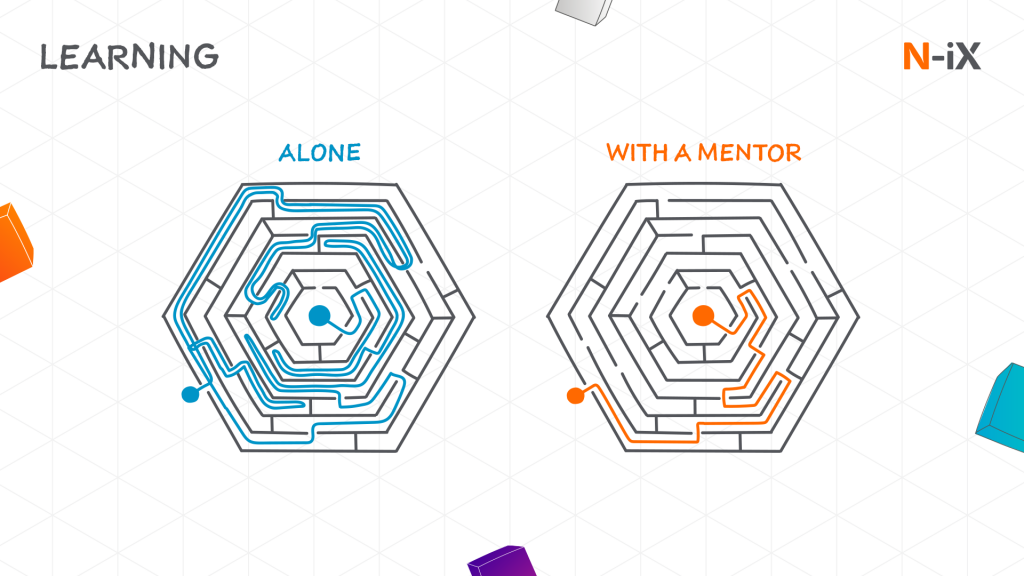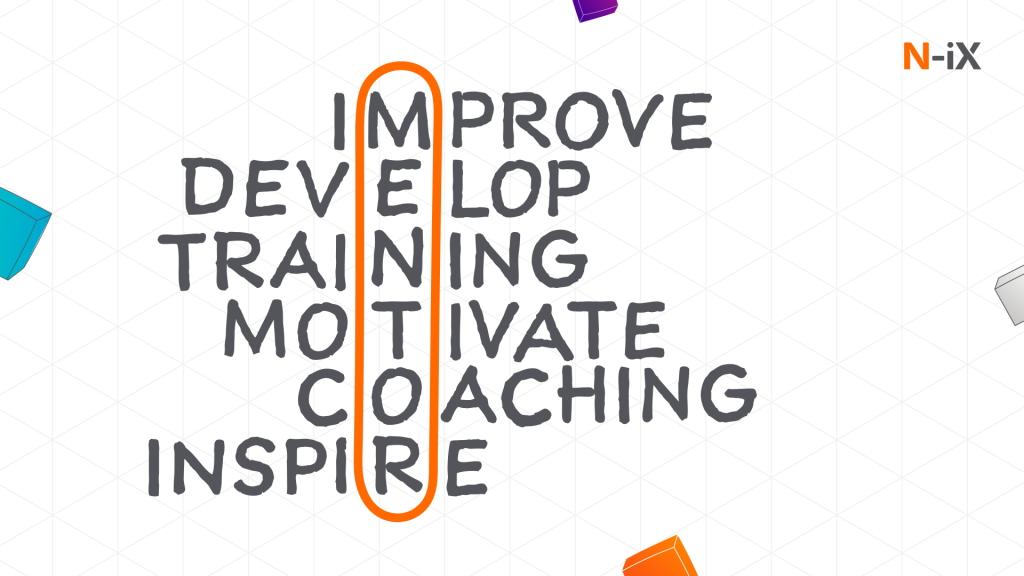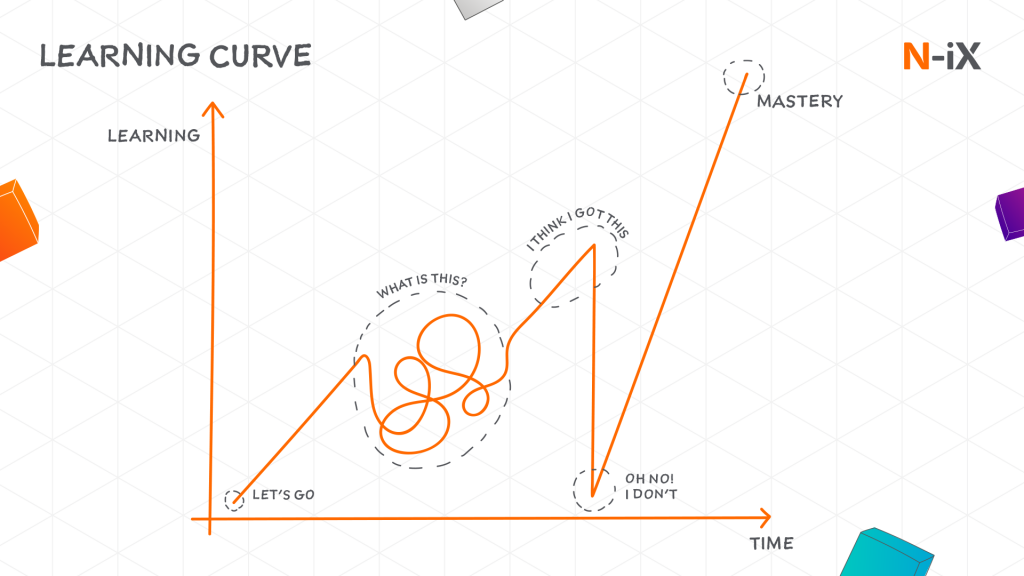Eduard’s development journey at N-iX included two separate mentorships at different stages of his career, each focusing on specific professional goals.
Each mentorship addressed unique learning goals: Bohdan and Ostap, experienced Software Engineers (Big Data), guided Eduard through distinct technical challenges — from deepening his data engineering expertise to mastering complex architectural concepts.
These targeted mentorship experiences not only helped Eduard grow professionally but also provided Bohdan and Ostap with rewarding mentoring experiences.
In this interview, they share what made their mentorships effective, lessons learned along the way, and how these experiences shaped Eduard’s professional development.
1. Why did you decide to join the mentorship program at N-iX?
Bohdan (Mentor): The desire to teach and help others motivated me to become a mentor. I believe it’s essential to guide mentees in the right direction, especially in today’s world where there’s an overwhelming amount of information and resources. Without proper guidance, it can be challenging to structure and prioritize learning effectively. Through mentorship, I aim to help mentees focus on what truly matters and achieve their goals efficiently.
Ostap (Mentor): They say the best way to deepen your knowledge is to teach it, and I fully agree. Even when you think you understand a topic well, explaining it to someone else often reveals new aspects and insights. And of course it helps the mentee to improve, it’s truly a win-win experience where both parties benefit.
Eduard (Mentee): As a data engineer, I recognized that mentorship from an experienced specialist would be invaluable for my growth. The mentorship program offered me a structured way to gain insights from someone who has already navigated similar challenges. I was looking for a mentor to deepen both my theoretical and practical technical knowledge, learn from someone who has encountered and overcome specific project obstacles, and apply those insights to future projects. Additionally, I wanted to enhance my decision-making skills within projects.
2. How do you structure your mentoring sessions to make sure they’re productive?
Bohdan (Mentor): Discipline is the key to success. In our first session, I identify the areas that need improvement and create a structured plan for further development based on these needs. We hold sessions weekly, each accompanied by homework assignments.
Ostap (Mentor): I usually divide each session into two parts: theory and practice. We start with a discussion of the theoretical concepts, then I assign a “homework” task. At the beginning of the next session, we go over the mentee’s work, discuss their approach, and explore the best solutions together. We typically meet for an hour each week, which gives us a good balance of progress and flexibility.
Eduard (Mentee): Our mentorship sessions took place once a week, lasting about an hour, following a clear plan that we discussed in advance. I typically prepared questions and topics where I faced challenges, such as specific issues with my projects or skills I wanted to develop. We set interim goals and regularly checked progress to stay on track. This structured approach was effective, as it kept us focused on my growth while allowing flexibility to discuss any immediate concerns.
 3. What’s been the most rewarding part of being in a mentorship program?
3. What’s been the most rewarding part of being in a mentorship program?
Bohdan (Mentor): Watching the continuous growth of my mentee has been incredibly rewarding. It was especially satisfying to learn that Eduard achieved his desired promotion from junior to middle-level engineer.
Ostap (Mentor): The most rewarding part is seeing the mentee’s progress and knowing that I’ve been able to help them get there. It’s very fulfilling to watch someone grow and to know you played a part in that.
Eduard (Mentee): The most valuable insight so far has been the confidence to tackle new challenges and the skill to break down complex tasks into manageable steps. Working with a mentor has given me a clearer understanding of my strengths and areas for improvement. Seeing my progress and knowing that I can independently apply new techniques has been incredibly rewarding. Throughout the mentorship program, I’ve significantly enhanced my theoretical knowledge across various areas, enabling me to view tasks from multiple perspectives.
4. Can you share an example of a challenge that was overcome with the help of mentoring?
Bohdan (Mentor): Eduard consistently showed initiative and diligently completed all assignments, which made our mentoring process smooth and productive. Because of his proactive attitude, there weren’t any significant challenges or obstacles that stood out during our work together.
Ostap (Mentor): There was one instance where we were working on generating a sequence of dates. I had a solution in mind, but when Eduard showed me his approach, I was pleasantly surprised. He solved it in a completely different way, and the code worked well. I even learned a new algorithm from his solution that I hadn’t encountered before.
Eduard (Mentee): There was a time when I faced challenges with optimizing a data pipeline in Spark. My mentor helped me analyze the problem areas and guided me in applying techniques like segmentation and batch processing. Together, we reviewed the code, discussed best practices, and I was able to implement the optimizations successfully. This experience taught me a lot about diagnosing issues and optimizing workflows, and I now apply these skills in my daily work.
5. How do you set goals and measure progress throughout the mentorship?
Bohdan (Mentor): In every session, I combine theoretical material with hands-on practice, as I firmly believe that practice is essential for mastering any subject. Each session begins with a review of the homework from the previous lesson. This helps us measure progress consistently and ensures the mentee is absorbing the material effectively.
Ostap (Mentor): Homework assignments make tracking progress straightforward. If the mentee completes the task independently, it shows they’ve grasped the concept, and we can move on to the next goal. If more practice is needed, we revisit the topic until they feel confident.
Eduard (Mentee): At the outset, we set both short-term and long-term goals, such as improving my technical skills and gaining a deeper understanding of architectural principles. We broke these objectives down into achievable steps and regularly checked in on progress. Progress was measured through outcomes on training projects, my ability to solve problems independently, and feedback from my mentor on my development.
6. How has being part of this program contributed to your personal or professional growth?
Bohdan (Mentor): Mentorship has allowed me to share my knowledge while also deepening my understanding of topics through the insightful questions from my mentee. These interactions have helped me better structure my thoughts and improve my expertise in the process.
Ostap (Mentor): As I mentioned, teaching requires you to revisit and really understand a subject deeply, which sometimes reveals things you might have missed before. You have to anticipate questions and be ready with clear answers. Also, explaining concepts and creating examples on the spot has helped me improve my soft skills. Mentorship has been a great way to stay updated and strengthen my teaching abilities as well.
Eduard (Mentee): Since starting the mentorship program, I’ve become much more proactive in tackling challenges and more confident in my problem-solving approach. Mentorship has also helped me develop a strategic mindset toward data engineering, giving me a better understanding of how my work aligns with broader business processes. Now, I not only write code but also see the bigger picture and recognize the impact of my work.

7. What specific skills or knowledge do you focus on during the mentoring sessions?
Bohdan (Mentor): We focus on core technologies essential to our industry, ensuring a solid foundation for day-to-day tasks. Additionally, I encourage my mentee to continuously develop their skills and stay updated on the latest trends in our field. This combination of technical expertise and proactive learning is key to long-term growth.
Ostap (Mentor): During our first session, we created a list of topics based on the mentee’s goals, and we prioritized them from most to least important. We’ve been working through this list, focusing on the areas that will benefit the mentee the most.
Eduard (Mentee): We focused primarily on advanced data engineering topics, including Spark optimization, Kafka architecture, and ensuring data pipeline reliability.
8. How do you balance giving guidance while fostering independence?
Bohdan (Mentor): During our sessions, I encourage my mentee to think independently by tackling practical tasks and challenges. Homework assignments play a crucial role in helping them develop critical thinking skills and approach problems on their own, fostering a sense of independence while still providing guidance when needed.
Ostap (Mentor): For the theoretical part, I provide the guidance, but when it comes to the practical tasks, I encourage the mentee to work independently. The mentee explores solutions on their own, which builds confidence and problem-solving skills.
Eduard (Mentee): My mentors were excellent at guiding me without providing direct answers. Instead of solving problems for me, they would ask questions that encouraged me to consider alternative solutions and analyze my own approach. This made me much more independent and capable of finding solutions on my own.
9. What’s been a proud moment in your mentoring journey?
Bohdan (Mentor): I was really proud when I found out that Eduard had successfully moved to the next step in his career. It’s great to see his progress and know I could help along the way.
Ostap (Mentor): A proud moment was when Eduard came up with a solution that was even better than the one I initially suggested. It’s very rewarding to see a mentee exceed expectations and become increasingly skilled.
Eduard (Mentee): Each training project was filled with unique approaches. It’s incredibly rewarding to see the final result when you’ve built your own solution using complex techniques and algorithms, and it works correctly — or even better than both you and your mentor anticipated.

10. Would you recommend the mentorship program to others, and if so, why?
Bohdan (Mentor): I would definitely recommend the mentorship program to both aspiring mentors and mentees. For mentors, it’s a great opportunity to share knowledge while revisiting long-forgotten theory. For mentees, it’s a chance to gain valuable insights, learn best practices, and understand how to grow professionally with guidance from a more experienced engineer.
Ostap (Mentor): Definitely — it’s challenging, but absolutely worth it. Mentorship lets you connect with new people, keep your own skills sharp, and develop your soft skills. It’s a great way to grow as both a developer and a mentor.
Eduard (Mentee): Absolutely, I would highly recommend it. Having a mentor has significantly accelerated my growth, provided clear direction, and offered a valuable space for questions and learning. The mentorship program has been essential to my technical and professional development, and I believe it is invaluable for anyone looking to advance in their career.
If you’re inspired by Eduard’s story and want to be part of N-iX, check out our open positions.

 Ukraine
Ukraine